The Making of a Portrait
Newt Gingrich's Portrait
 |
|
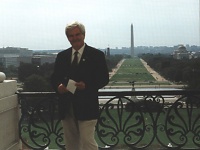 |
|
Recently it was suggested by an art critic
who does not specialize in painting, that
my portrait of the Speaker 'looks like it
must have been done from a photo'. I really
wish it were that easy. To begin with, I
decided that Newt would be facing the viewer,
with the Mall behind and the sunlight hitting
his face. The sun had other plans. It couldn't
shine through the solid structure of the
capitol. Also, the column wasn't exactly
where I needed it to be to line things up
as I had in mind. The Washington monument
is very tall and could have easily distracted
from the portrait. You can also see how
much artistic license I employed with the
perspective of the railing and the scene
below. And of course, the color is never
right in photos.
During the August congressional recess
in 2000, I was able to spend the better
part of three days sketching, painting and
studying the view on the Speaker's balcony.
I knew I would not have another opportunity
to work there before the painting was scheduled
to be unveiled.
|
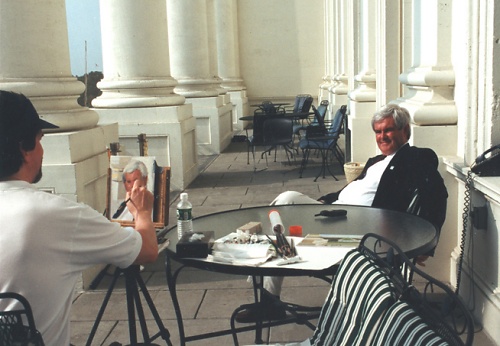
| I almost always begin with a small study in
oil paint to familiarize myself with the colors
of the face. At this point I am only interested
in determining the colors I will use later to
make it appear that Newt is standing on the
balcony and the sunlight is striking him. Because
the sun can't actually do that, at least not
at the angle I wanted, I turned Newt around
to face the Mall while I did this sketch. |
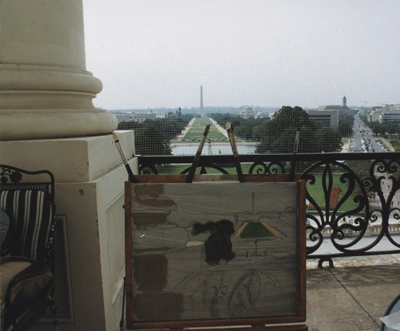
|
This oil sketch is not very far along at
this point. I did it so that I could familiarize
myself with the look and feel of the scene
including the various trees and structures.
It didn't matter that I planned to place
the column on the other side of my painting
I was primarily interested in studying the
colors. I am using a small painter's box
called a pochade box. Much more compact
than my smallest easel, it is convenient
to use when working out of doors.
|
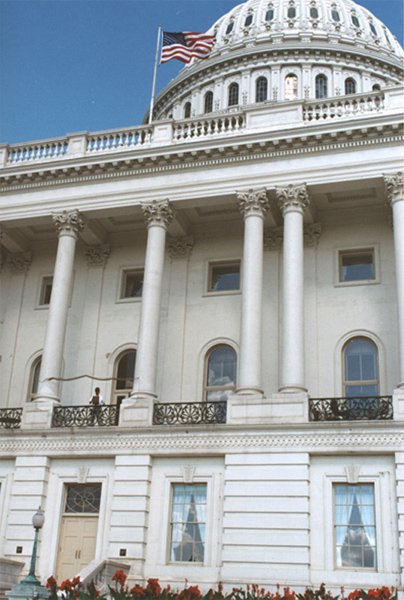
| From this distant photo that my wife took
of me painting, you can get a sense of the
scale of the U.S. Capitol building and where
the Speaker's balcony is. There is a large
net to keep birds from flying into the building.
There now is a 'window' in it that can be
lifted to see out more clearly. I rolled this
up while I painted. |
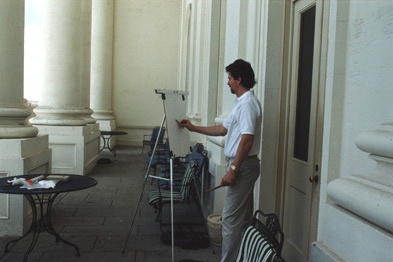
| During much of the time I spent on the Speakers
balcony I sketched and figured how I would
compose the picture. I wanted at least a part
of one of the columns to show because they
are such a characteristic part of the balcony.
I felt that the view of the Mall was best
if it was symmetrical and not seen at an angle.
I also wanted to include the Smithsonian's
Museum of Natural History without it being
blocked by the Speaker's shoulder. I also
wrestled with the perspective in regards to
the railing and where it would intersect the
view below. There was a lot to juggle, a lot
to reconcile. In the end it was necessary
to invent much of the painting. |

| In doing my homework before beginning this
project I read a paper the Speaker had authored
called 'The
Age of Transitions'. It contained a diagram
with three 'S' curves. I thought I would attempt
to work this pattern into the portrait if
possible. This is the diagram and the box
formed by the two current 'S' curves. |
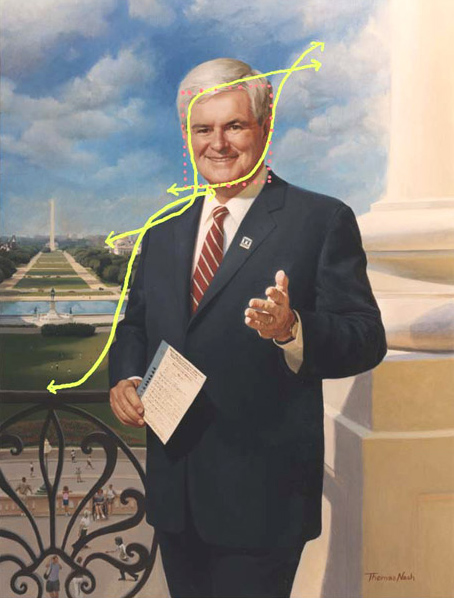
| This shows the 'Age of Transitions' diagram
laid over the painting. I arranged it so that
the Speaker's head would be in the center
of this pattern because this is something
that he is very knowledgeable about. The old
iron railing corresponds with the part of
the 'S' curve that describes the early days
of the industrial revolution. Other portions,
like the sleeve and shoulder are less related
in terms of content. The last portion of the
third 'S' curve is in the clouds, a traditional
symbol of the future. The challenge I faced
was making sure that it didn't look forced,
that the clouds didn't look obviously placed
there to create a shape. |
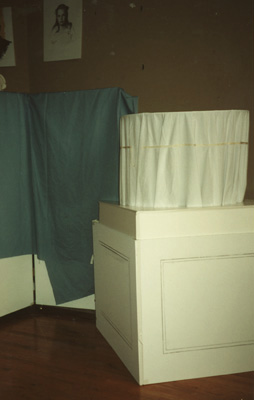
| To help me determine the light and shadow
that would appear on the base of the column
and how the shadows would fall when the Speaker
stood next to it, I built an exact scale replica
in my studio out of canvas and other materials. |

| At the time this photo was taken in my studio,
I was considering different positions for
the left hand in the painting. This is evident
by the full-scale charcoal drawing behind
us. I made many of these as I worked out my
compositional ideas. I would later decide
to have the Speaker gesturing as he often
does while speaking. |
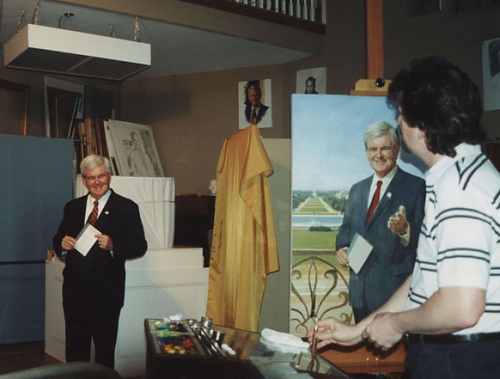
| I arranged a very large light fixture to
emulate the sun. I left the north light drapes
of my studio open just enough to light the
canvas. At this point there is still much
to be done on the painting. The mall and sky
and Newt's suit are only blocked in. I have
yet to add any people down in front of the
Capitol or on the Mall itself. |
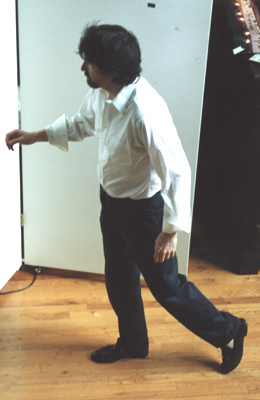
| One final fun note. Most of the people who
gathered in front of the Capitol during this
project were waving and smiling at the Speaker
and looking directly up towards the balcony.
I needed more people to just be walking by
to make the scene more typical of a day in
Washington. I had my wife take a snapshot
of me from the balcony overlooking my studio.
Using that I painted a rough approximation
of myself into the Speaker's portrait. You
can just see it down at the bottom. This was
the photo I referred to. |












